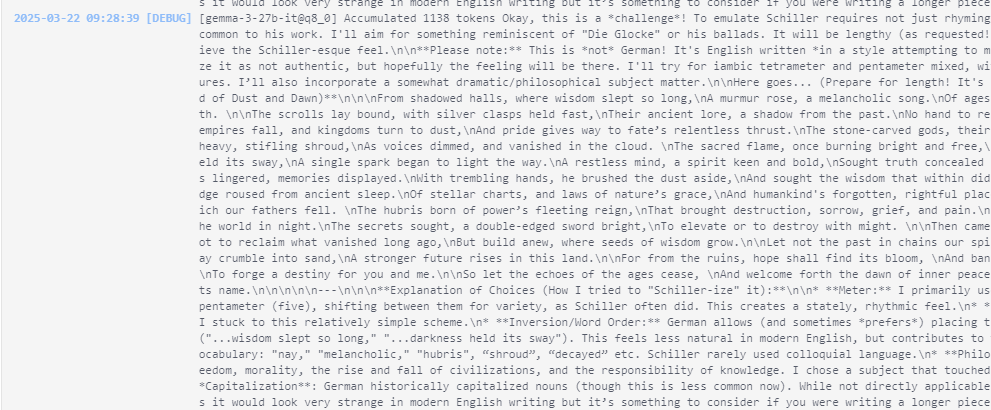|
OverviewThis script demonstrates how to process an text-Input and use the LM Studio API to do some A.I. work using an AI model wit 128k-Token Contextwindow.
The script:- Uses an Text-Prompt - Escapes the Prompt bevor inserting it into the JSON - Sends the JSON Payload it to LM Studio's API - Returns an AI-generated description
About LM StudioLM Studio is a free, open-source desktop application that allows users to discover, download, and run large language models (LLMs) locally on Windows, macOS, or Linux. It provides a user-friendly GUI to interact with models from Hugging Face, ensuring data privacy by keeping everything offline. The Model: Gemma-3-27b-it and gemma-3-27b-it@q8_0The script uses 'gemma-3-27b-it@q8_0' as the AI model. Gemma is a family of lightweight, open-source LLMs developed by Google, designed for research and efficient local deployment. The '3' indicates the third generation, '27b' refers to 27 billion parameters, and 'it' denotes an instruction-tuned variant optimized for tasks like image analysis. '@q8_0' specifies 8-bit quantization, reducing memory usage while maintaining performance, ideal for local execution on consumer hardware.
Script Code to have it generate a Text
' specify the model to use. $$MOD=gemma-3-27b-it@q8_0
' API Setup: ' Defines the base URL for the API endpoint $$URB=http://localhost:1234/ ' Defines the specific API endpoint for chat completions $$REA=v1/chat/completions ' Combines the base URL and endpoint to create the full API URL VAV.$$URL=$$URB$$REA
' Initializes HTTP headers (no initial headers) HTP.InitHdr|-|- ' Adds a header specifying that the content type is JSON HTP.AddHdr|Content-Type|application/json ' Adds an authorization header (currently empty, may need a token) HTP.AddHdr|Authorization|Bearer -
' AI Configuration: ' Defines the system prompt – instructions for the AI $$SYS=You are a helpful assistant. ' Defines the user prompt – the question to ask the AI $$USR=please make me a long rhyme that sounds like schiller in german
' Escape the System Prompt ' Escapes special characters in the system prompt for safe JSON inclusion AIC.ESC|$$SYS|$$ESS
' Escape strings for JSON using AIC.ESC ' Escapes special characters in the user prompt for safe JSON inclusion AIC.ESC|$$USR|$$ESU
' Combines the escaped user prompt into a variable called $$CNT VAV.$$CNT=$$ESU
' Constructs the JSON payload for the API request: model name, system message, user message, max tokens, temperature, and streaming flag VAV.$$JSO={"model": "$$MOD", "messages": [{"role": "system", "content": "$$ESS"}, VAV.$$JSO+ {"role": "user", "content": "$$CNT"}], "max_tokens": 100000, "temperature": 0.7, "stream": false}
' HTTP Request: ' Specifies that this is a POST request $$CMD=POST ' Disables debug output from the HTTP requests HTP.Setdebug|0 ' Sets a timeout of 3600 seconds (1 hour) for the HTTP request HTP.SetTO|3600000 ' Sends POST request with 3600s timeout HTP.Request|$$CMD|$$URL|$$JSO|0|0|0|0|$$RET
' Response Handling: ' Parses the JSON response from the API into a document object ($$DOC) PSJ.Parse|-|$$DOC ' Specifies the path within the JSON response where the AI’s answer is located $$PAT=choices[0].message.content ' Extracts the AI’s answer from the parsed JSON and stores it in $$TEX PSJ.GetStr|$$DOC|$$PAT|$$TEX ' Displays the extracted text ($$TEX) in a message box MBX.$$TEX ' Gets the last result as wide string PSJ.GetLastResultW|$$TEA ' Sets the unitext to the AI response CLB.Set Unitext|$$TEA ' Frees memory used by the JSON parsing functions PSJ.FreeAll ' Ends the script ENR.
|

Part of the Server output in LM-Studio during the processing of the Script.
